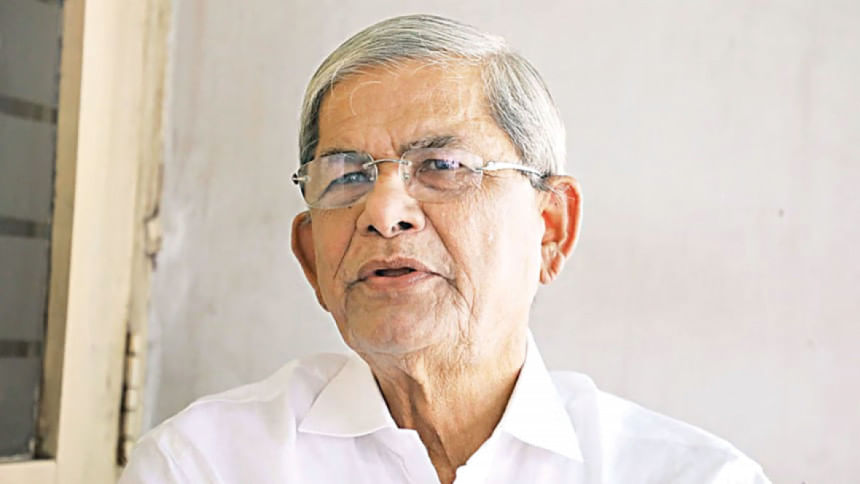Kamaruzzaman, SQ Chowdhury, Mir Quasem framed

BNP Secretary General Mirza Fakhrul Islam Alamgir yesterday urged all political parties to participate in the upcoming polls to help restore the democratic process in Bangladesh."I call upon all political parties to join the coming election by putting aside small differences so that together we can bring back democracy in the country and return to the democratic system," he said while speaking at an event marking the 21st founding anniversary of the Daily Nayadiganta.Fakhrul said he believes the...
BNP Secretary General Mirza Fakhrul Islam Alamgir yesterday urged all political parties to participate in the upcoming polls to help restore the democratic process in Bangladesh.
"I call upon all political parties to join the coming election by putting aside small differences so that together we can bring back democracy in the country and return to the democratic system," he said while speaking at an event marking the 21st founding anniversary of the Daily Nayadiganta.
Fakhrul said he believes the election will be held on time in February next year.
"We also think that through an acceptable election to all, we will get an opportunity to return to a democratic system."
The issue of reforms has already been settled as the political parties agreed upon them and signed the July National Charter.
Fakhrul also said that Jamaat-e-Islami leaders Muhammad Kamaruzzaman and Mir Quasem Ali, as well as BNP leader Salahuddin Quader Chowdhury, were sentenced to death in "false" cases over crimes against humanity committed in 1971.
Recalling the post-Liberation War period, he said the media, particularly the press, faced severe repression.
About 60 lakh political leaders and activists faced false cases, about 20,000 were killed and 1,700 others were victims of enforced disappearance during the 'fascist rule' of the Awami League, he said.
"After the establishment of Baksal in 1975, all newspapers were shut down. I remember that many journalists became unemployed and some even worked as hawkers in front of Baitul Mukarram as there were no newspapers left."
After the political changeover in 1975, BNP founder President Ziaur Rahman was the first to move away from the one-party system and introduce multi-party democracy, ensuring press freedom.
"We must not forget that the key reforms began during his [Zia's] time and were later carried forward by former prime minister Begum Khaleda Zia," Fakhrul added.
At the same event, BNP Standing Committee member Salahuddin Ahmed yesterday warned that the nation will not forgive political parties if fascism returns to Bangladesh because of their divisions.
"If our disunity and divisions ever open the door for the return of fascism, the nation will never forgive us. We must, therefore, stay united."
All parties must stand together and close every door to the return of the fascist Awami League, he said.
"I hope in the coming days we will all remain united despite our differences of opinion and ideology when it comes to the country, its democracy, independence and sovereignty."
It is a sacred duty for all to build a strong democratic state and society for future generations.
Recalling his personal struggles, Salahuddin said: "For writing a few columns, I had to live in exile for nearly nine and a half years, endure torture at Aynaghar and spend time in prison."
Sharing a memory, he said: "Once, Amar Desh Editor Mahmudur Rahman and I were kept in separate prison cells at PG Hospital. He was on a hunger strike then. I tried to convince him to break his fast, telling him that if he died, Sheikh Hasina would be happy. Later, senior leaders intervened and he broke the strike after six or seven days."
Salahuddin went on to urge the media to play a constructive role through their writing in building a democratic state.